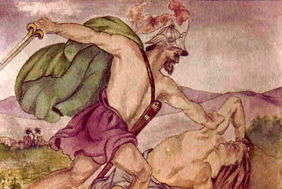
Abner, Saul's military leader, gathers his forces at Gibeon, a non-Israelite city aligned with Israel that is within Benjaminite tribal territory and is close to Saul's capital at Gibeah. Abner's mission may have been to test Philistine control of this land, but he runs into Joab, David's nephew and leader of some of David's forces. (It is worth noting that David may have maintained authority over Judah with the approval of the Philistines who may have still assumed that David was a renegade Israelite.)
Confrontation seems immanent between Abner and Joab, both Israelites, which is perhaps why Abner proposes a limited battle, 12 vs. 12. This small scale battle then gets out of control.
The three sons of David's sister, Zeruiah, are intemperate warriors. Recall Abishai wanted to kill Saul while Saul was sleeping (1 Sam. 26), and Asahel seems to be rash and fleet of foot. Abner is a seasoned fighter and does not want to kill Asahel for fear of Joab. The narrative goes to great lengths to describe how Abner has no choice but to kill.
This battle reminds us of the end of Judges in which inter-tribal warfare, brother killing brother, becomes the epitomy of tragedy. And as in Judges, these killings involve Benjaminites. It is an awful scene described with graphic imagery.
Clearly David must be a ruler who will unite a fractious, scattered, and inter-violent Israelite nation. Saul's rule has left a wake of brother-on-brother killing; the journey from the time of the judges to the aftermath of the first monarch is a sad journey indeed. David has his hands full, but he seems determined to follow God's will.
For application:
"Blessed are the peacemakers..." Are these just trite words? Human beings have been and will always be violent - prone to tribal conflict that, if left unchecked, devolves into hatred, irrationality, and violence, whether the tribes are Judah vs. Benjamin, Ukraine vs. Russia, or even Democrat vs. Republican. How might Christians be better peacemakers?
Confrontation seems immanent between Abner and Joab, both Israelites, which is perhaps why Abner proposes a limited battle, 12 vs. 12. This small scale battle then gets out of control.
The three sons of David's sister, Zeruiah, are intemperate warriors. Recall Abishai wanted to kill Saul while Saul was sleeping (1 Sam. 26), and Asahel seems to be rash and fleet of foot. Abner is a seasoned fighter and does not want to kill Asahel for fear of Joab. The narrative goes to great lengths to describe how Abner has no choice but to kill.
This battle reminds us of the end of Judges in which inter-tribal warfare, brother killing brother, becomes the epitomy of tragedy. And as in Judges, these killings involve Benjaminites. It is an awful scene described with graphic imagery.
Clearly David must be a ruler who will unite a fractious, scattered, and inter-violent Israelite nation. Saul's rule has left a wake of brother-on-brother killing; the journey from the time of the judges to the aftermath of the first monarch is a sad journey indeed. David has his hands full, but he seems determined to follow God's will.
For application:
"Blessed are the peacemakers..." Are these just trite words? Human beings have been and will always be violent - prone to tribal conflict that, if left unchecked, devolves into hatred, irrationality, and violence, whether the tribes are Judah vs. Benjamin, Ukraine vs. Russia, or even Democrat vs. Republican. How might Christians be better peacemakers?

 RSS Feed
RSS Feed